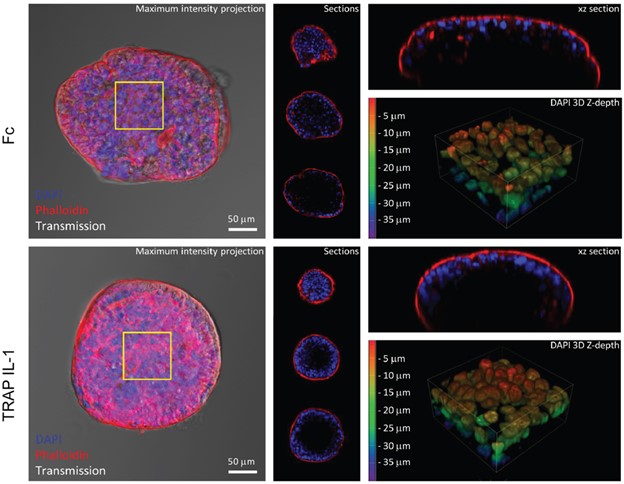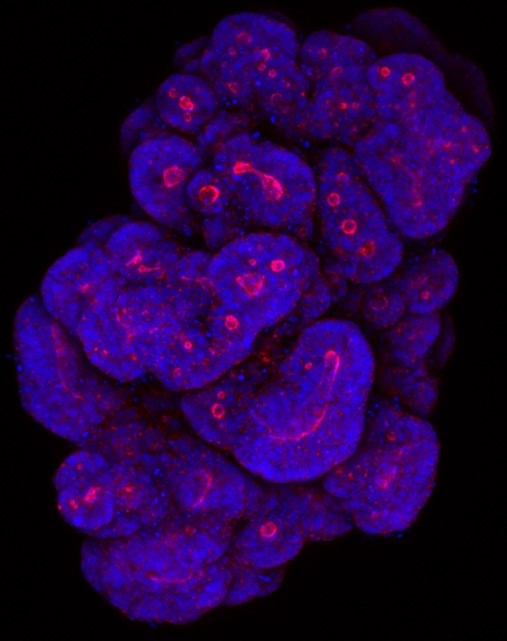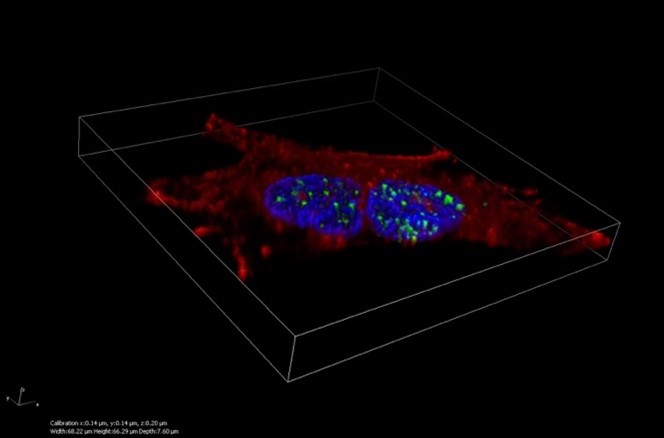The Role of Tyrosine Kinase Membrane Receptors (RTK) in Tissue Homeostasis and Cancer Progression; mRNA biomarkers in colo-rectal cancer
The research activities focus on studying the molecular mechanisms activated by RTKs, using confocal microscopy, CRISPR/CAS9, organoids, signalling analysis, an preclinical in vivo evaluations. In addition, we are investigating transcriptomics for validating RNA biomarkers.

There are two principal research areas.
- The first concerns the identification of molecular mechanisms activated by tyrosine-kinase membrane receptors (RTK) in the physiological maintenance of tissue homeostasis mediated by transcriptional feedback mechanisms. The mechanisms are altered during cancer progression and the therapeutic response to monoclonal antibodies.
- The second area is the clinical validation of four potential biomarkers, for screening and early diagnosis of colo-rectal cancer. This project has spawned the spin-off CELTIC Medical, with the participation of the Ateneo of Bologna and NLC Ventures Netherlands B.V., for the marketing of the patent based on the “CELTiC” panel.

Research areas
Receptors of the ErbB family: Modulation of EGFR signalling by cross-talk with other membrane receptor pathways
Research project
The role of senescence induced by IL-1 in the inhibition of EGFR by monoclonal antibodies
Research objectives
The project is focused on studying the role of IL-1 in the mediation of therapeutic resistance to monoclonal antibodies capable of neutralizing EGFR
In addition to the genetic alterations, the resistance acquired from anti-EGFR therapy can be triggered by non-mutational events mediated by the drug’s activation of alternative pathways.
The discoveries we have made in recent years have shown that as a result of treatment with cetuximab (CTX), patients who don’t respond to therapy are producing IL-1, which demonstrates a post-senescent phenotype. The working hypothesis indicates that a combination of drugs which simultaneously inhibit EGFR and IL-1should be the therapy of choice for patients with metastasizing colo-rectal cancer.

Research project
The development of ‘recombinant decoys’ to neutralize the soluble factors in the tumor micro-environment.
Research objectives
In this project, we have created a soluble fusion protein which we call TRAP-Fc in the truncated extracellular domain of the IL1R receptor. The recombinant product TRAP-Fc maintains high-affinity binding with the interleukins IL1A and IL1B, resulting in neutralization in the tumor micro-environment.

Research area
‘Omics’ strategies for personalized medicine.
Research project
The autocrine loop of ALK receptor and ALKAL2 ligand is an actionable target in Consensus Molecular Subtype 1 colon cancer
Ongoing research projects
The pharmacological inhibition of the tyrosine-kinase receptor ALK represents a potential therapeutic approach in patients with colo-rectal cancer of Consensus Molecular Subtype 1.
The ALK receptor in its wild-type form, following activation with the ligand ALKAL2, is responsible for proliferation, survival, and migration mechanisms; this discovery suggests new possibilities for therapeutic strategies, in particular the use of the CRC subtype.

Research project
MET receptor regulates perinuclear actin cap remodelling: implications for genomic instability
Ongoing research projects
The identification of new pathways downstream from the MET receptor, implicated in the modulation of peri-nuclear actin fibers, and the successive impact on the nuclear architecture, cellular signaling, and DNA damage (genomic instability) during cellular migration.
Research area
Evaluation of a new diagnostic method for colo-rectal cancer.
Research project
Conducting the CELTiC trial: a multi-centric, international study to evaluate the CELTiC panel in identifying advanced neoplasias in FIT-positive individuals.
Ongoing research objectives
The current priority objective is to estimate the diagnostic characteristics (sensitivity, specificity, positive predictive value, etc.) of the panel of the four CELTiC mRNA blood markers (CEACAM6, LGALS4, TSPAN8 e COL1A2) for the detection of: false positives, high- and low-risk lesions, or colo-rectal cancer in a cohort of subjects who tested positive for fecal occult blood. An additional objective is the study of the molecular basis for the different blood profiles of the four CELTiC blood markers.
principal investigator
-
Full Professor
Dipartimento di Scienze Mediche e Chirurgiche - DIMEC
Via Massarenti 9
Bologna (BO)
Tel: +39 051 20 9 4118
TEAM
Valerio Gelfo
Adjunct professor
Gabriella Mattei
Area dei Funzionari - Settore socio-sanitario
Martina Mazzeschi
Adjunct professor
Donatella Romaniello
Senior assistant professor (fixed-term)
Michela Sgarzi
Adjunct professor
Rossella Solmi
Alma Mater Professor
Collaborazioni
Alessandra Morselli, membro del team
Prof. Yosef Yarden, Weizmann Institute of Science, Israel
Prof. Ruth Palmer, University of Gothenburg, Gothenburg, Sweden
Prof. Yael Mosse, Perelman School of Medicine at the University of Pennsylvania, USA
Prof. Balazs Giorffy, Institute of Enzymology, Budapest, Hungary
Prof. Gabriele D’Uva, Department of Experimental, Diagnostic and Specialty Medicine (DIMES), University of Bologna
Prof. Andrea Ardizzoni, Department of Experimental, Diagnostic and Specialty Medicine (DIMES), University of Bologna
Prof. Michelangelo Fiorentino, Department of Experimental, Diagnostic and Specialty Medicine (DIMES), University of Bologna
Prof. Luigi Ricciardiello, Department of Medical and Surgical Sciences, University of Bologna,
Dott. Spartaco Santi, Institute of Molecular Genetics, National Research Council of Italy, Bologna, Italy